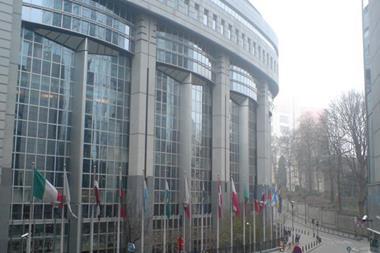Flouting European unfair competition rules is becoming increasingly costly. But some companies still do not seem to be taking the message on board
European competition authorities are cracking down hard on companies that try to compete unfairly through cartels, price fixing and bid rigging. The message from the European Commission is clear. ‘If you flout the rules you will be caught, and it will cost you dear.’ This was European Competition Commissioner Neelie Kroes’ warning to firms following the imposition of a record fine on Microsoft in February. The regulator has imposed its ten highest cartel fines in the last six years. Under European competition rules fines can hit as much as 10 % of a company's global yearly revenue.
Judging by the many hefty fines and large scale sector investigations, such as last year’s inquiry into conditions of competition in European business insurance, it seems that the EU is willing to take the necessary steps to protect consumers. In the Commission’s own words: ‘Talk is cheap. Flouting the rules is expensive.’
European Competition policy is about making sure that people and companies have the right to choose. This ties in to a European Commission initiative aimed at approving redress for consumers across all member states as part of its consumer strategy 2007 - 2013. The Commission has shown that it is committed to tough sanctions on companies unwilling to follow the rules. Considering the size of fines being applied in some cases, businesses face a challenging time. The size of the fines often reflects the authority’s belief that only a level of fine which is sufficiently high fulfils the intended goal of preventing cartels, by making them not profitable for companies.
Although the EU has publicly stated that it won’t go as far as the US, where massive financial incentives encourage lawyers to go after businesses that are under investigation, Ian Giles, a senior associate in the competition team at Norton Rose, fears that competition enforcement could be heading closer to the US model. ‘This is a frightening thing for European businesses to grapple with because the US model is so much more intrusive and damaging that the system already in place,’ he says.
In the US, in addition to investigation by authorities, the class action damages system means ‘victims’ of anti-competitive behaviour can often take the offenders to court. Similarly, in Europe not only can the EU impose fines but any firm or individual that has suffered damage due to the existence of a cartel can seek civil redress for their losses by claiming compensation before a court in a member state where the loss occurred.
In March 2007 the consumer association ‘Which?’ issued the first ever representative action under the UK’s Enterprise Act against JJB Sports on behalf of 130 consumers, following a decision from the Office of Fair Trading (OFT) that JJB and others had infringed competition rules by participating in arrangements to fix prices of replica football shirts.
And if this weren’t enough to cause alarm, organisations also face the threat of criminal investigations. The OFT—the UK’s national competition authority—has indicated that it will not shy away from seeking criminal sanctions, including imprisonment for anyone involved in cartel activity.
‘Companies within the EU can face criminal and civil sanctions in the domestic market in which the activity is alleged to have occurred, as well as financial penalties at a European level if a breach of Article 81 of the European Treaty is proved,’ says Neill Blundell a partner within the business and regulatory investigations unit at law firm Russell Jones and Walker.
Companies will surely not want to face criminal investigations that expose them to significant reputational damage. Yet many companies appear not to be taking the threat seriously.
One of the largest fines ever imposed was levied against Microsoft for 899m Euros after it failed to comply with an earlier antitrust order. The penalty stems from the anti trust campaign waged by the EC over Microsoft’s Window’s monopoly. The Commission said Microsoft had abused its position of market dominance by refusing to supply important interoperability information that servers needed to work with its Window’s operating system. In the UK, the OFT has ominously warned that it is on the hunt for ‘Microsoft-style’ dominance cases.
Also, among the largest ever fines imposed by the Commission for cartel violations is the 992m Euros penalty on a lifts cartel, which included ThyssenKrupp, in February 2007. The companies were accused of rigging bids for procurement contracts, fixing prices and allocating projects to each other. It emerged that fake bids, too high to be accepted, were lodged by the companies who were not supposed to win the tender, in order to give the impression of genuine competition.
The EC also fined Dutch brewers Heineken, Grolsch and Bavaria approximately 274m Euros for operating a cartel on the beer market in the Netherlands. The Commission had evidence that in all four brewery groups high-ranking management participated in the cartel meetings and discussions. There was also evidence that the companies were aware that their behaviour was illegal and took measures to avoid detection.
Towards the end of January this year the EC imposed fines totalling around 34m Euros on the Bayer and Zeon groups for fixing synthetic rubber prices. The investigation started with surprise inspections in March 2003. The Commission said that between late 2000 and 2002, Bayer and Zeon managed to raise or otherwise stabilize prices through a series of meetings and other illicit dealings. The firms managed to get their fines reduced significantly—30% and 20% respectively—by coughing up information to the authorities. However Bayer had its fine raised because it had been fined for cartel activity in a previous Commission decision.
In a similar instance, Virgin Atlantic sought leniency from the OFT following its investigation into price fixing. British Airways admitted that between August 2004 and January 2006, it entered an agreement with Virgin Atlantic over surcharges that were added to ticket prices. BA was fined £121.5m but Virgin escaped a fine after it managed to persuade the OFT that it qualified for immunity under its leniency policy. The OFT has also indicated it is pursuing a criminal investigation into whether any individuals dishonestly fixed the levels of the surcharges.
‘If a company believes it may have been involved in activity breaching the EA 2002, it should take immediate legal advice and consider seeking leniency under S190 (4) of the EA 2002,’ says Blundell.
For Phillip Rees, head of Hugh James’ London office, the major problem for companies is that it is difficult to assess the likely effects of an action, whether it’s a merger or acquisition, and how the Competition authorities are going to look at it. ‘Quite often companies are not deliberately breaking the rules it’s just judging the potential effects of an activity is hard.’
‘The definition of competition law is both qualitative and quantitative. Quite often boards focus on the quantitative and not the qualitative. Organisations should consider the softer issues that the Commission can take into account? In the Microsoft case, for example, the Commission looked at interoperability issues that were qualitative,’ says Rees.
He adds: ‘All the relevant stakeholders need to take a view of the macro and micro issues that could result from the activity. A useful tool for this is a reporting database which follows all the issues and allows key stakeholders to comment.’
The biggest cartel sentence in Finland so far took place in December 2007. In its decision the Finish Competition Authority imposed a total 19.4m Euros fine on around 9 companies who had participated in an asphalt cartel. The companies were found guilty of price and bidding cooperation nationally.
Elsewhere in Europe, the Portuguese Competition Authority Council imposed a fine of 38m Euros on PT Comunicações for abuse of a dominant position in denying its competitors Tvtel and Cabovisão access to its underground conduit network. The investigation was opened in 2003, after a complaint by Tvtel into the denial of access to conduits. Community and Portuguese competition legislation prohibits and punishes the refusal to provide access to essential infrastructure. The Portuguese competition authority said the refusal to grant access resulted in the fact that around 73,000 homes were unable to make a free choice of a cable television provider.
This points to another issue for industry, which is the growing link between regulators. Already there is the European Competition Network that links the Commission’s competition body with all the individual national competition authorities in the EU. Information on investigations is shared and used between the bodies and there are also bilateral arrangements between the US, Europe and Asia, which means investigations are becoming global in nature.
As well as imposing fines and controlling mergers and acquisitions the Commission also has the power to launch sector investigations that make life difficult for business. Last year’s business insurance sector inquiry reopened the debate surrounding broker transparency and disclosure. That was preceded by the now famous Spitzer inquiry in the US.
Estimations of the fallout from former New York attorney General Eliot Spitzer’s 2004 inquiry say it cost Marsh around $850m. Spitzer accused the broker of bid rigging and anti-trust among other things. Many brokers, including Marsh, announced sweeping changes to their business models in the wake of the investigation, which threw a spotlight on all types of enhanced commission. The investigation also triggered a federal class action lawsuit, which accused Marsh of violating the RICO (Racketeering Influence and Corrupt Organizations Act). A federal court dismissed all of the federal antitrust and RICO claims asserted against Marsh and other industry participants.
The European pharmaceutical sector has also been tagged for scrutiny. In January the Commission launched a sector inquiry into competition in the pharmaceuticals sector. The Commission said the inquiry was a response to indications that the pharmaceutical markets may not be working well for consumers. ‘Fewer new pharmaceuticals are being bought to the market, and the entry of generic pharmaceuticals sometimes seems to be delayed,’ said the authority. As part of the investigation the regulator said it would conduct unannounced inspections at the premises of a number of innovative and generic pharmaceutical companies. The inquiry is due to examine whether agreements between pharmaceutical companies, such as settlements in patent disputes, may infringe Article 81 of the EC Treaty prohibiting restrictive business practices. It will also look at whether companies may have created artificial barriers to entry—through the misuse of patent rights, litigation or other means—infringing the Treaty’s ban on abuses of dominant market positions. An interim report is planned for autumn 2008 and final results are expected in the spring of 2009.
Last year the OFT published some figures from a survey of senior competition lawyers in the UK and Brussels. Respondents were asked if they had any suggestions for what could be done to improve deterrence of competition law infringements in the UK. The report finds: ‘The most frequently made suggestions included: increased publicity and education, encouraging private damages actions, faster decision taking, more criminal prosecutions for cartels and more decisions/greater enforcement activity.’ The survey also suggests that over the period 2004-06, for every OFT investigation into a merger, cartel or abuse of dominant position at least five other anti-competitive agreements are prevented from taking place.
Clearly the regulatory environment for business is becoming more complicated and in the competition arena at least the threat of costly financial penalties and/or criminal investigations looms large. To stop them falling foul of the law and to help relevant managers and stakeholders take a view of all the issues, companies may want to start thinking earlier about scoping the level of risk inherent in any action regulated by the competition authorities. This could involve risk managers getting involved in the audit process earlier when it appears that competition may be being prevented, distorted or restricted.
The Microsoft market dominance case
February 2008: The EC imposed a record 899m Euros fine on Microsoft after it failed to comply with a 2004 antitrust order.
It was the third time in four years that the Commission imposed fines or penalty payments on Microsoft. 'That the Commission has been forced to levy these three fines reflects a clear disregard by Microsoft of its legal obligations,' said European Competition Commissioner Neelie Kroes.
The Software giant's apparent sluggishness in heeding competition rules could be explained away by the fact that even a penalty of this size amounts to but a fraction of the $14.07bn it earned in fiscal 2007. In all the company has been fined just under $2.4bn by European antitrust regulators over the years.
The latest fine follows on investigation triggered by a 1998 complaint from Sun Microsystems. It alleged Microsoft was refusing to supply important interoperability information that servers needed to work with its Window's operating system.
The Commission's decision of March 2004 required Microsoft to disclose interface documentation which would allow non-Microsoft work group servers to achieve full interoperability with Windows PCs and servers at a reasonable price.
Initially, Microsoft demanded royalty fees for access to the secret interoperability information. Following concerns from the Commission over the levels of pricing, Microsoft reduced its royalty rates for sales within Europe while leaving the worldwide rates unchanged. From 22 October 2007 Microsoft provided a licence giving access to the interoperability information for a flat fee.
The most recent decision concluded that the royalties that Microsoft charged for the interoperability information prior to 22 October 2007 were unreasonable.
The Commission said: 'Microsoft continued to stifle innovation by charging other companies prohibitive royalty rates for the essential information they needed to offer software products to computer users around the world. Charging such an unreasonable price effectively rendered the offer of the information pointless.'
The fine dwarfs an earlier penalty of Euro 497.2m imposed on Microsoft in March 2004 for abusing its dominant position in the PC operating systems market by deliberately restricting interoperability between Windows and non-Microsoft work group servers, and by tying its Windows Media Player (WMP), a product where it faced competition, with its ubiquitous Windows operating system. The Software giant was also ordered to share interoperability information with rivals and sell a version of Windows without media software. Microsoft fought the EU's decision but it lost and was fined again for failing to obey that order.
Microsoft is reviewing the Commission's action but has yet to decide whether or not to appeal the recent penalty. It remains the subject of oversight in the US. A spokesperson said: 'As we demonstrated…with our new interoperability principles and specific actions to increase the openness of our products, we are trying to focus on steps that will improve things for the future.' It added that the recent fine related to past issues that had been resolved.
Postscript
Nathan Skinner is senior reporter, StrategicRISK



















No comments yet